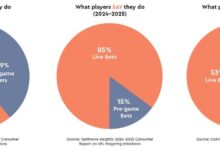Top Games of 2025 Focus on Holistic Player Wellness

The year 2025 marks a pivotal moment in the history of interactive entertainment. The video game industry, once confined to consoles and PCs, has exploded into a multifaceted ecosystem driven by groundbreaking technology, unprecedented creative freedom, and a new understanding of the player experience. This isn’t just about faster graphics or more powerful consoles; it’s about a fundamental shift in how we play, connect, and immerse ourselves in digital worlds. This article will take a deep dive into the top games of 2025, exploring the core trends defining this new era, from the rise of cloud gaming and the integration of AI to the burgeoning world of immersive VR/AR and the new focus on holistic player wellness. We will look at the games that are pushing the boundaries and the technologies that are making them possible, and the profound impact this will have on the future of entertainment.
The Core Trends of 2025

The gaming world of 2025 is a far cry from the consoles and cartridges of the past. It is a dynamic and interconnected landscape defined by several key trends.
A. Cloud Gaming’s Ubiquity
The era of expensive gaming hardware is nearing its end. Cloud gaming has gone mainstream, allowing players to stream high-fidelity games to any device with an internet connection—be it a smartphone, a smart TV, or a low-end laptop. This democratizes access to the most demanding games and eliminates the need for expensive upgrades. The player’s device becomes a simple window to a powerful server, allowing for a seamless and high-quality gaming experience anywhere, anytime. This is a game-changer for casual players and for those in regions with limited access to expensive gaming hardware.
B. The AI-Powered Experience
Artificial intelligence is no longer just for non-player characters (NPCs) with simple scripts. In 2025, AI is a core part of the gaming experience, creating more dynamic, personalized, and responsive worlds.
- Dynamic Storytelling: AI can now dynamically alter a game’s narrative based on a player’s choices and actions. This creates a unique and personalized story for every player, making each playthrough a new and unpredictable adventure.
- Generative Content: AI can generate new game content—from quests and landscapes to dialogue and enemy behavior—on the fly. This allows for massive, ever-evolving worlds that never feel repetitive or static.
- Intelligent NPCs: NPCs are becoming more intelligent and lifelike. They can learn from a player’s behavior, remember past interactions, and react in a way that feels organic and authentic. This creates a new level of immersion and a deeper connection to the game’s world.
C. The Blurring of Reality with Immersive Tech
Virtual Reality (VR) and Augmented Reality (AR) are moving beyond niche entertainment into a more holistic and social experience. VR headsets are becoming lighter, more powerful, and more comfortable, while AR glasses are poised to integrate the digital world with our physical reality. The metaverse, once a futuristic concept, is becoming a tangible space where people can socialize, work, and play in a shared virtual world.
The Best Games of 2025
The games defining 2025 are not just visually stunning; they are experiences that leverage the latest technologies to create something truly unique and memorable.
A. Chronos: The Aetherium Chronicle
This flagship RPG is a masterpiece of AI-driven storytelling. The game’s narrative is a living entity, with characters, quests, and events that are dynamically generated based on a player’s actions. No two playthroughs are the same, and the game’s world is constantly evolving, making it a truly unique and personalized experience. The game’s stunning visuals are rendered in real-time on powerful cloud servers, allowing it to be streamed to any device.
B. Project Nexus
This VR-native title is the pinnacle of immersive entertainment. It’s a full-body VR experience where players, using haptic suits and advanced motion controllers, can interact with a virtual world with an unprecedented level of realism. The game’s narrative is a deep, psychological thriller that uses the power of immersion to create a sense of genuine dread and suspense. It’s a perfect example of how VR can be used to tell stories that are simply impossible in a traditional medium.
C. Urban Sprawl: A City of Tomorrow
This is a new kind of social sandbox game that lives on the cloud. It’s a massive, shared virtual city where players can build, create, and socialize. The game’s economic system is powered by blockchain technology, allowing players to truly own their digital assets and to buy, sell, and trade with other players. It’s a social experiment on a massive scale, with a vibrant, player-driven economy that is constantly changing.
The New Era of Player Wellness

The gaming industry is also starting to recognize its responsibility to the player’s well-being. A new emphasis on holistic wellness is changing how games are designed and how players interact with them.
A. Gaming for Mental and Physical Health
Video games are being designed not just for entertainment but for their therapeutic and cognitive benefits.
- Stress Reduction: Games with a focus on mindfulness, puzzle-solving, and a calm aesthetic are being used to help players de-stress and relax.
- Cognitive Enhancement: Games that challenge a player’s memory, problem-solving skills, and reaction time are being used to improve cognitive function and to help with conditions like ADHD.
- Physical Activity: VR games are providing a new, fun way for people to exercise. Full-body VR workouts and fitness titles are gaining a massive following, turning a sedentary hobby into a physical one.
B. The Social Gaming Experience
The best games of 2025 are not just about a single player; they are about a shared, social experience.
- Cross-Platform Play: The ability for players on different devices and platforms to play together has become standard. This creates a new level of social connectivity and a larger community for every game.
- In-Game Communities: Games are becoming social hubs where people can not only play together but also form communities, make new friends, and share their creativity.
- Holistic Community Management: The best gaming companies are investing in community managers and AI-powered tools to ensure that their online communities are safe, inclusive, and welcoming for everyone.
Challenges and Opportunities
While the future of gaming is bright, there are significant challenges that must be addressed to ensure that this revolution is inclusive and sustainable.
A. The Digital Divide
The full benefits of cloud gaming and VR are dependent on a player’s access to a high-speed internet connection. This creates a new digital divide, where individuals in regions with limited infrastructure are left behind. Closing this gap is a crucial step for the future of gaming.
B. Data Privacy and Security
The integration of AI and biometric data in gaming raises serious concerns about data privacy and security. Companies must be transparent about how they collect, store, and use a player’s data, and new regulations will be needed to protect a user’s privacy in these immersive digital worlds.
C. The Ethical Use of AI
The power of AI in game development also raises a number of ethical questions. How do we ensure that AI-generated content is not plagiarized? How do we ensure that AI-powered NPCs do not perpetuate harmful stereotypes? The gaming community and developers must work together to create a set of ethical guidelines for the use of AI in gaming.
Conclusion
The best gaming experiences of 2025 are a testament to a new era of innovation, creativity, and player-centric design. Cloud gaming has made high-fidelity entertainment accessible to everyone, dismantling the barriers of expensive hardware. The integration of artificial intelligence is fundamentally changing how we play, creating dynamic, personalized, and ever-evolving worlds that are as unpredictable as they are immersive. The mainstream adoption of VR and AR is blurring the lines between the digital and physical realms, opening up a world of new possibilities for social interaction, work, and education.
However, as we celebrate these milestones, we must also confront the significant challenges that lie ahead. The digital divide, data privacy, and the ethical use of AI are not just technical hurdles; they are fundamental issues that will define the future of gaming. The industry’s new focus on player wellness and a holistic approach to the gaming experience is a positive step forward, but more work is needed to ensure that our digital worlds are not only fun but also safe, inclusive, and healthy for everyone. The future of gaming is not just about faster consoles or better graphics; it’s about a new kind of entertainment that connects us, empowers us, and challenges us in a way that is as unique and personal as we are. The best gaming experiences of 2025 are just the beginning of this incredible journey, and the future of play has never been more exciting.










